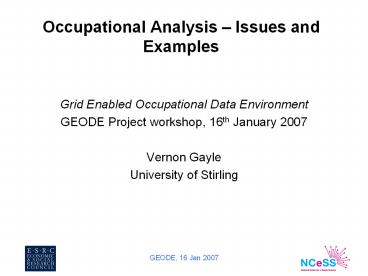Occupational Analysis PowerPoint PPT Presentation
Title: Occupational Analysis
1
Occupational Analysis Issues and Examples
- Grid Enabled Occupational Data Environment
- GEODE Project workshop, 16th January 2007
- Vernon Gayle
- University of Stirling
2
The Youth Cohort Study of England and Wales
- Concentrate on one social survey
- Youth Cohort Survey of England and Wales (YCS)
3
The Youth Cohort Study of England and Wales
- Major Longitudinal Study
- Began in the Mid 1980s
- Designed to monitor behaviour of young people
as they - reach the minimum school leaving age and either
stay on in education of enter the labour
market
4
The Youth Cohort Study of England and Wales
- UK Government survey
- Originally Department of Education and Science
then inherited by various successors - Overall the survey is a monitoring instrument
for Government but has obvious social science
potential
5
The UKs Missing Birth Cohorts
- The YCS is particularly important as a source of
nationally representative information on young
people - Helps to fill the data gap left by not having new
cohorts of large-scale birth cohort data in the
UK - (Gayle 2005)
6
General Structure of the YCS
- Postal Survey
- Study contacts a sample from an academic year
group (cohort) in the spring following completion
of compulsory education - The sample is designed to be representative of
all Year 11 pupils in England Wales - Originally sample are tracked for 3 waves
(called sweeps) of data collection
7
YCS Sampling
- Sample was multi-stage cluster until wave 5
- Simplified sample (approx 10)
- Documentation states SRS but Systematic Sample
of days in the month of birth (e.g. 5th, 15th
etc.) - YCS3 (1987) 16K young people
8
YCS Change and Stability
- The questionnaire designed to be broadly
comparable - External changes and shifts in policy interests
have brought about changes - Changes Major and Minor!
9
YCS Change and Stability
Cohorts YEARS YEARS YEARS YEARS YEARS YEARS YEARS YEARS YEARS YEARS
85 86 87 88 89 90 91 92 93 94
1 1 2 3
2 1 2 3
3 1 2 3 4
4 1 2 3
5 1 2 3
6 1 2 3,4(a)
10
YCS Change and Stability
Cohort Years Years Years Years Years Years Years Years Years Years Years
94 95 96 97 98 99 00 01 02 03 04
7 1 2
8 1 2 3(a)
9 1 2 3,4(a)
10 1,2(a) 3
11 1 2 3
11
YCS Complexity
- Less in terms of sampling and individual survey
design - More in terms of comparing cohorts
12
Social Class and Education
- The relationships between family background
(social class) and education have been a policy
for over 100 year in Britain (e.g. Foster Act
1870) - In the past education has been fairly
extensively analysed in terms of social class
(Reid 1998 p.157) - Research on social background typically
measures social class as some function of
parental (historically fathers) occupation -
Examples are legion
13
Problems Relating to Occupational Information in
YCS
- Generic problems to collecting, coding and
translating occupational information in surveys - Some specific to the YCS
14
Examples from Questionnaires
- Parental information is collected
- Although the exact information collected has
changed - Usually information on job title and
self-employment
15
Examples from Questionnaires
- Remember that this is a postal questionnaire
survey - Asking a 16/17 year old about their parents
job - YCS 1 apprx 6130 Dads working full-time
- apprx 5524 occupational codes (apprx
10 missing)
16
Examples from Questionnaires
- Documentation is very poor especially in the
older - cohorts usually handwritten annotation on
- questionnaires (pdf)
- Compare this with the BHPS for example
17
Examples from Questionnaires YCS1
18
Examples from Questionnaires YCS10
19
Examples of Analyses
- Drew et al. (1992) analyses earlier data
constructed a measure (Professional
Intermediate Manual) - Gayle et al. (2000 2002) analysis of YCS 3
constructed a measure of family social class
(highest - father or mother) using Registrar
General - Raffe et al. (2006) undertaking cross-cohort
analyses harmonised a variable based on NS-SEC
(Managerial/Professional Intermediate Manual) - Connolly (2006) analysing YCS 9 10 relied on
a modified version of Registrar General deposited
with the data and a version of SEC for YCS11
20
What is there?
- Some early cohorts often code parental
occupations using C080 - Later cohorts use SOC90
- Some cohorts do not included detail
occupational codes - Generally there is self-employment information
- but not detailed employment status information
(e.g. Employers Managers Supervisors etc).
21
What is there?
- Some cohorts include a SEG measure (e.g. standard
16 categories in YCS 7 but there is no clear
information on how these are derived) - Cohort 9 reports SEG but in practice this is a
modified version of the Registrar General Schema
with (Class I and Class II merged) - Parental occupation is normally asked in sweep
1 YCS3 asks in sweep 2 and there is apprx. 24
sample attrition - Later YCS cohorts more thought into
collection of appropriate data but data coding
(and therefore translation) is still problematic
22
What is the problem?
- Varying quality of occupational information
- Compared to some other surveys little attempt
to sort out occupational information - Raffe et al. tried to work up a time-series
data set with a harmonised family social class
measure see also team member Croxford (2004)
23
Can Geode help?
- In principle yes overall task of
harmonisation - Definitely for YCS data depositors!
- In practice Gayle et al. could have been helped
directly in the construction of their family RG
Social Class measure - In the talk only mentioned family social class
but there is also occupational information on
young workers - In principle the GEODE idea could extend to
qualifications harmonising qualification is
equally problematic in the YCS

